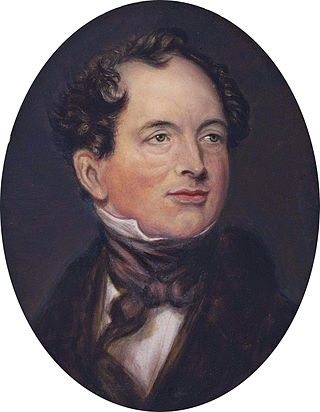Related Research Articles

Thomas Moore, also known as Tom Moore, was an Irish writer, poet, and lyricist celebrated for his Irish Melodies. His setting of English-language verse to old Irish tunes marked the transition in popular Irish culture from Irish to English. Politically, Moore was recognised in England as a press, or "squib", writer for the aristocratic Whigs; in Ireland he was accounted a Catholic patriot.

Benjamin Rush was an American revolutionary, a Founding Father of the United States and signatory to the U.S. Declaration of Independence, and a civic leader in Philadelphia, where he was a physician, politician, social reformer, humanitarian, educator, and the founder of Dickinson College. Rush was a Pennsylvania delegate to the Continental Congress. He later described his efforts in support of the American Revolution, saying: "He aimed right." He served as surgeon general of the Continental Army and became a professor of chemistry, medical theory, and clinical practice at the University of Pennsylvania.

Abraham Colles was Professor of Anatomy, Surgery and Physiology at the Royal College of Surgeons in Ireland (RCSI) and the President of RCSI in 1802 and 1830. A prestigious Colles Medal & Travelling Fellowship in Surgery is awarded competitively annually to an Irish surgical trainee embarking on higher specialist training abroad before returning to establish practice in Ireland.

John Cheyne FRSE FKQCPI was a British physician, surgeon, Professor of Medicine in the Royal College of Surgery in Ireland (RCSI) and author of monographs on a number of medical topics. He was one of the people to identify Cheyne–Stokes respiration.
Edward O'Reilly was an Irish scholar active in the first half of the 19th century.

General Henry Lawes Luttrell, 2nd Earl of Carhampton PC was an Anglo-Irish politician and soldier, who both in public and private life attracted scandal. He was spurned by colleagues in the British House of Commons who believed that in the election of 1769 he had played an underhand role in denying his seat to the popular choice, the reformer John Wilkes. In 1788 he was publicly accused in Dublin of raping a twelve-year-old girl. Ten years later, his command in the suppression of the Irish rebellion of 1798 was criticised by fellow officers for its savagery, and not least against women. His last years in Parliament were marked by his opposition to Catholic Emancipation, and to parliamentary reform.
Events from the year 1837 in Ireland.
Events from the year 1768 in Ireland.

James Johnson was an influential British writer on diseases of tropical climates in the first half of the nineteenth century. Born in Ireland, at the early age of 15 he became an apprentice to a surgeon-apothecary in Antrim for two years. After spending two further two years in Belfast, he moved to London for the surgeon's examination, which he passed in 1798. Immediately afterwards, he was appointed surgeon's mate on a naval vessel, on which he sailed to Newfoundland and Nova Scotia. In 1800 he took part in an expedition to Egypt and, in 1803, sailed for India.
Joseph Brenan was a poet, journalist and author, and leading member of the Young Irelanders and Irish Confederation.

Jervis Street Hospital was a hospital in Jervis Street in Dublin, Ireland. The site of the hospital became the Jervis Shopping Centre.

The Westmoreland Lock Hospital was a hospital for venereal disease originally located at Donnybrook and later moved to Lazar's Hill, Dublin, Ireland.

The Cork Street Fever Hospital, also known as the House of Recovery, was a hospital located in Cork Street in Dublin, Ireland.
John Milner Barry (1768–1822) was an Irish medical doctor.
John Brennan was born at Ballahide, County Carlow, about 1768 and died in Dublin on 29 July 1830. The Compendium of Irish Biography (1878) says of him:
"He was educated to the medical profession, and obtained a wide reputation for his successful practice in puerperal disorders. An excellent classical scholar, a man of talent and humour, his sallies were long remembered. As editor of the Milesian Magazine he unhappily prostituted his talents, by ridiculing for pay the Catholic leaders of his day, and abusing the members of his own profession ... In Notes and Queries, 3rd Series, will be found reference to a copy of the Milesian Magazine in the British Museum, containing a MS. key to Brennan's pseudonyms."
John Walker (1759–1830) was an English educational writer, physician, and advocate of vaccination.

Francis RyndMRCSI (1801–1861) was an Irish physician, known for inventing the hollow needle used in hypodermic syringes.
Sir Charles Scudamore (1779–1849) was an English physician, known for his writings on gout.

Sir James Murray (1788–1871) was an Irish physician, whose research into digestion led to his discovery of the stomach aid Milk of Magnesia in 1809. He later studied in electrotherapy and led the research into the causes of cholera and other epidemics as a result of exposure to natural electricity. He was the first physician to recommend the breathing in of iodine in water vapour for respiratory diseases.
Octavian De Spinellis or Ottaviano de Palatio was Archbishop of Armagh from 1478 until 1513.
References
![]() This article incorporates text from a publication now in the public domain : "Brenan, John". Dictionary of National Biography . London: Smith, Elder & Co. 1885–1900.
This article incorporates text from a publication now in the public domain : "Brenan, John". Dictionary of National Biography . London: Smith, Elder & Co. 1885–1900.